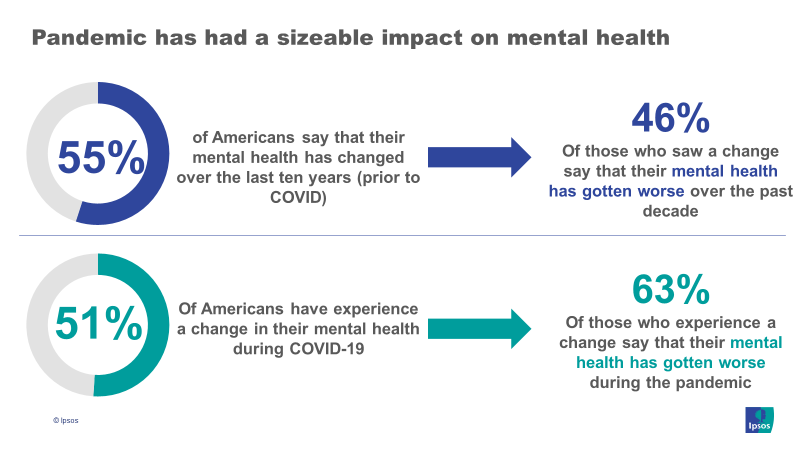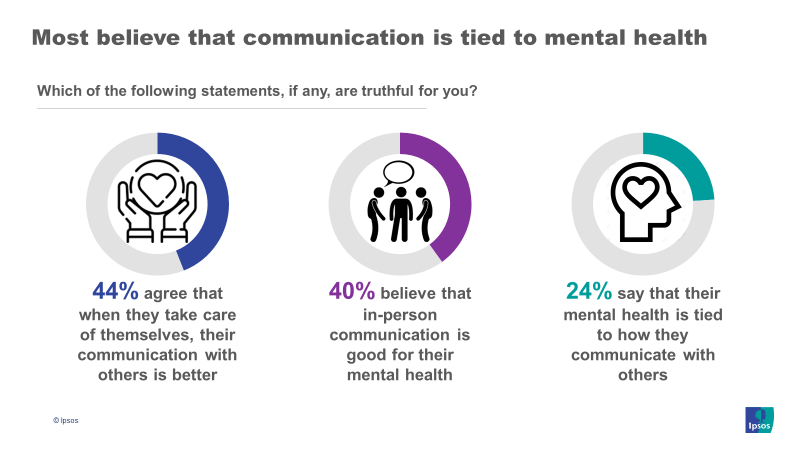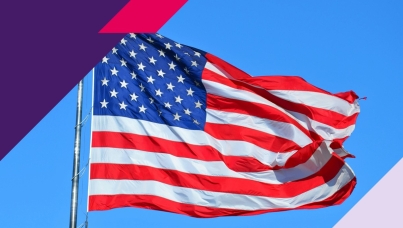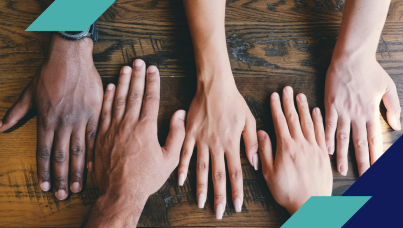Majority of Americans have changed the amount of time they spend communicating in-person compared to 10 years ago
Washington, DC, May 5, 2021 — A recent EvolveMKD/Ipsos poll finds that 56% of Americans have noticed a changed in the amount of time they spend communicating in-person compared to 10 years ago (prior to COVID-19). Among those who experienced a change, 53% say that they are spending less time communication in-person compared to a decade ago, while 47% say that their in-person communication has increased.
When it comes to their mental health more specifically, most Americans say that they have experienced a change in the past ten years (excluding the pandemic) – with 46% of those who saw a change saying their mental has gotten worse and 54% saying it has gotten better.
One in two adults (51%) have experienced a change in their mental health specifically during the COVID-19 pandemic – with 63% of those who saw a change saying their mental health has gotten worse in recent months, compared to only 37% who say that it has gotten better.
- Women are both significantly more likely to have noticed a decline in their mental health during COVID-19 (75% vs. 49%of men), and throughout the past 10 years (55% vs. 36%).

Seven in ten believe that communication is tied to mental health, including 40% who say that in-person communication is good for their mental health and one in four who say that their mental health is tied to how they communicate with others (24%). Just over two in five also say that when they take care of themselves, their communication with others is better (44%).

Most (79%) agree that self-communication - the ability to 'speak' to ourselves including the things we say to ourselves out loud, our inner dialogue, our body language, and the written word (such as a diary) – is very important and 51% report practicing self-communication multiple times a day. Nearly six in ten Americans (58%) believe that mental health plays a role in how well one self-communicates, with women (62%) particularly likely to agree compared to men (55%).
- Women are also significantly more likely to believe that relationships with others (50% vs. 44% of men) and gender (21% vs. 15% of men) play a role in how well people self-communicate.
About the Study
These are the findings from a series Ipsos polls conducted on behalf of EvolveMKD. For the initial survey, a sample of 1,000 adults ages 18 and over from the continental U.S., Alaska and Hawaii was interviewed online in English between July 22 – 31, 2020. For the second survey, a sample of 1,000 adults ages 18 and over from the continental U.S., Alaska and Hawaii was interviewed online in English between March 22 -25, 2021.
The samples for these study was randomly drawn from Ipsos’ online panel (see link for more info on “Access Panels and Recruitment”), partner online panel sources, and “river” sampling (see link for more info on the Ipsos “Ampario Overview” sample method) and do not rely on a population frame in the traditional sense. Ipsos uses fixed sample targets, unique to each study, in drawing a sample. After a sample has been obtained from the Ipsos panel, Ipsos calibrates respondent characteristics to be representative of the U.S. Population using standard procedures such as raking-ratio adjustments. The source of these population targets is U.S. Census 2018 American Community Survey data. The sample drawn for this study reflects fixed sample targets on demographics. Posthoc weights were made to the population characteristics on gender, age, race/ethnicity, region, and education.
Statistical margins of error are not applicable to online non-probability polls. All sample surveys and polls may be subject to other sources of error, including, but not limited to coverage error and measurement error. Where figures do not sum to 100, this is due to the effects of rounding. The precision of Ipsos online polls is measured using a credibility interval. In this case, the poll has a credibility interval of plus or minus 3.5 percentage points for all respondents. Ipsos calculates a design effect (DEFF) for each study based on the variation of the weights, following the formula of Kish (1965). This study had a credibility interval adjusted for design effect of the following (n=1,000, DEFF=1.5, adjusted Confidence Interval = +/-5.0 percentage points for all respondents).
For more information on this news release, please contact:
Kristin Vollrath
Director, US
Observer Full Service
[email protected]
Stacey Robinson
Senior Account Manager, US
Observer
[email protected]
About Ipsos
Ipsos is the world’s third largest Insights and Analytics company, present in 90 markets and employing more than 18,000 people.
Our passionately curious research professionals, analysts and scientists have built unique multi-specialist capabilities that provide true understanding and powerful insights into the actions, opinions and motivations of citizens, consumers, patients, customers or employees. We serve more than 5000 clients across the world with 75 business solutions.
Founded in France in 1975, Ipsos is listed on the Euronext Paris since July 1st, 1999. The company is part of the SBF 120 and the Mid-60 index and is eligible for the Deferred Settlement Service (SRD).
ISIN code FR0000073298, Reuters ISOS.PA, Bloomberg IPS:FP www.ipsos.com
About EvolveMKD
EvolveMKD is a public relations and digital communications agency that combines customized solutions with high touch client service. The agency's goal is to navigate the ever-changing world of how companies interact with consumers and become the dominating brand storytellers in the communications space. Through strategic thinking and flawless execution, EvolveMKD leverages its strong relationships across industries and key stakeholders to help our clients achieve superior business results.
Contact
EvolveMKD
646-517-4220



